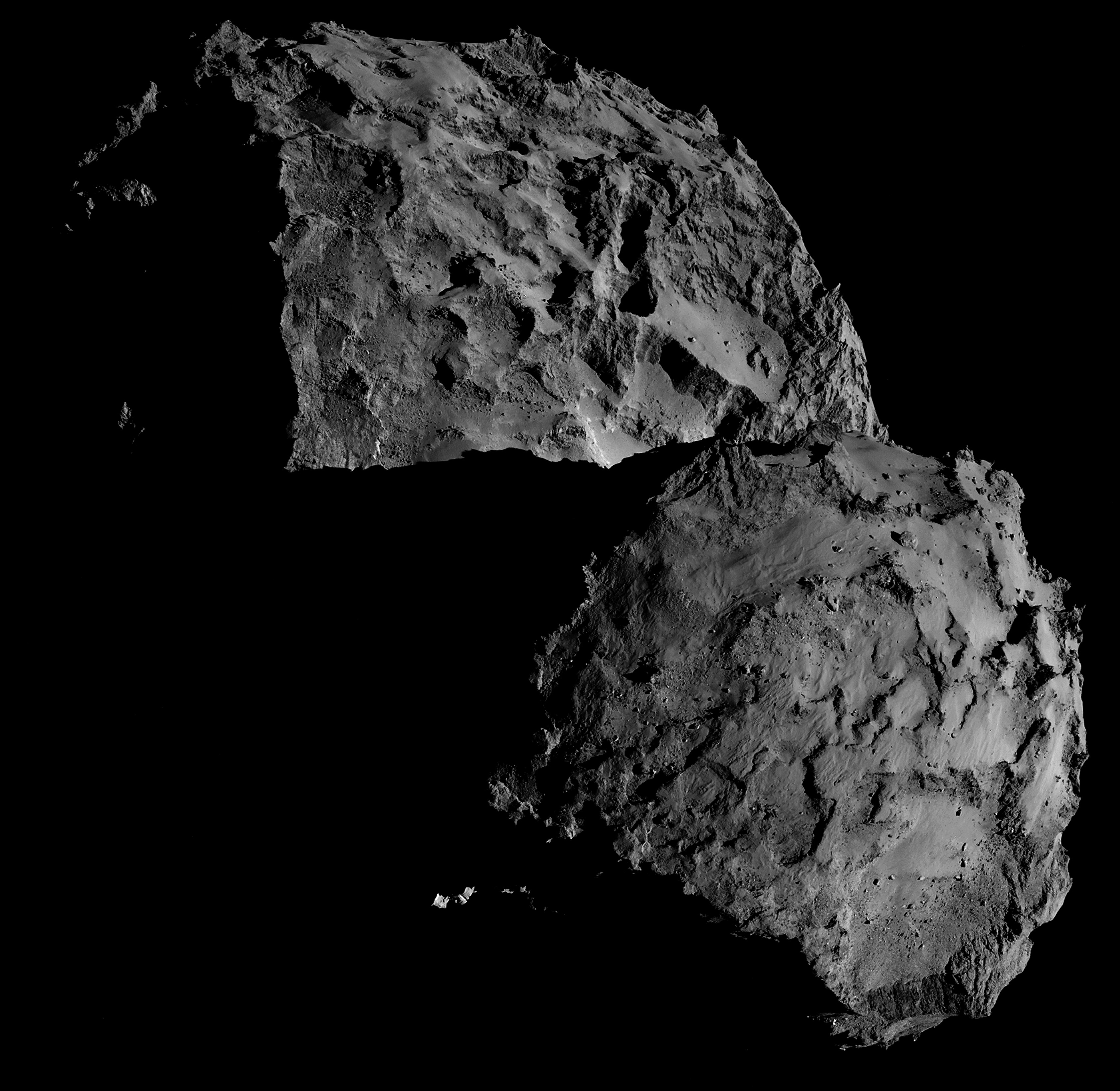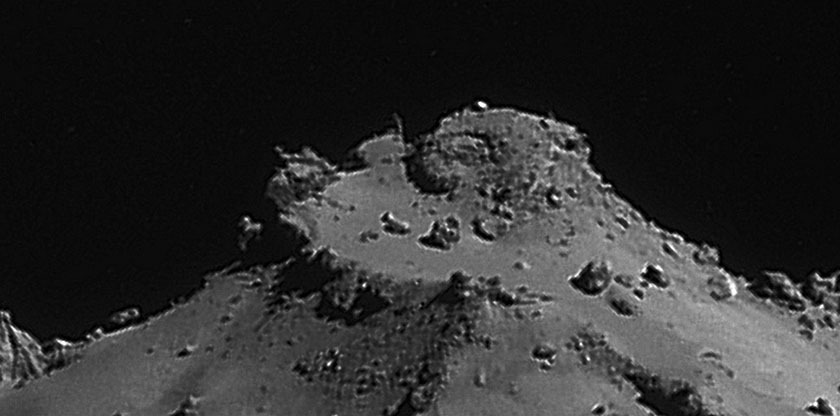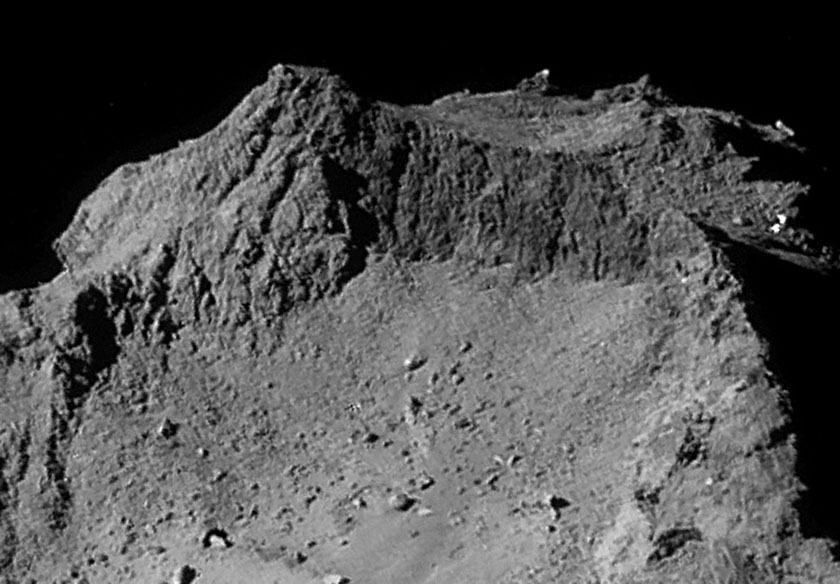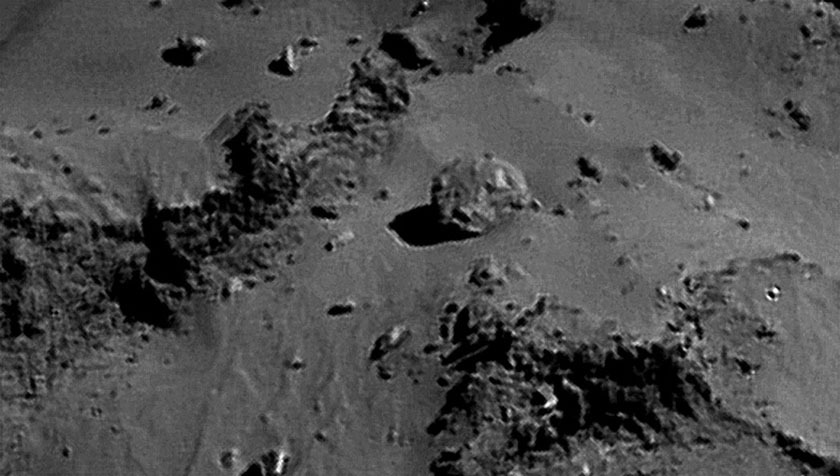True Blue Door
True Blue Door's JournalNew Rosetta Comet Closeups
Keep in mind that the little boulders seen here and there are the size of buildings:
Enhanceable (right-click-->View Image-->click the magnifying glass where you want to enhance):
[img] [/img]
[/img]
Zooms:
[img] [/img]
[/img]
[img] [/img]
[/img]
[img] [/img]
[/img]
[img] [/img]
[/img]
[img] [/img]
[/img]
[img] [/img]
[/img]
[img] [/img]
[/img]
Weeeeeeeeeeeird. Especially when you realize this thing has such minimal gravity that it mostly sticks together because of electrostatics.
A better word for plutocracy: Richtatorship.
I could never get behind the terms "plutocracy" or (gag) "corporatocracy." This is Pluto:
[img] [/img]
[/img]
And this is Pluto:
[img] [/img]
[/img]
So how is plutocracy rule by the rich? Yes, yes, I know the etymology - but most people don't and never will, and most people who do still don't make the association on a basic emotional level. But what alternative is there? "Corporatocracy" is a syllable-salad train wreck with no meaning at all to most people, and at best abstract associations for those who think.
Allow me to propose a better and comprehensive alternative to both terms: Richtatorship.
Now hold on, I know it isn't a pretty word. In fact it's puerile, but that's part of the point. It gets right to the dirty, shitty heart of the matter, and in a way that's still more linguistically elegant and powerful than the alternatives. The meaning and the moral value of that meaning are self-evident, and cut straight to the chase: Rich people doing whatever they want and making you do whatever they tell you. Everyone can relate to that - even most rich people themselves.
Whatever they collectively want, no matter how strongly opposed by the overwhelming majority of the American people, usually becomes law. And whatever they collectively do not want, no matter how strongly demanded by the overwhelming majority of the American people, usually does not become law. They corrupt every level of government, and commit all level of crime with impunity so long as their peers are not victims.
You won't win any intellectual prizes for using the word "richtatorship" or "richtator", but you'll leave a mark whose meaning everyone knows instantly.
A likely fact about the future that sickens me.
When clean energy is the only energy, when electric transport is the only transport, and there is no longer any financial incentive to deny climate change, conservatives will insist it was liberals who denied it and try to blame the state of the environment on liberalism.
I want Jerry Brown to run for President in 2016.
There are plenty of reasons why he won't - he's Reagan Old at this point; his state is Deep Blue, so he adds nothing electorally; and he appears to be serious about focusing 100% of his time on rebuilding California from its Prop 13-induced decline and Lost Decade(s).
Here's the thing though: He's succeeding. California is recovering on a deep, fundamental economic level, for the first time in decades. Budgets are steadily rising, and in a way that adds to rather than subtracts from the future. And he manages Republicans in the legislature in a way that suggests he is quite the Asshole Whisperer.
Brown clearly knows something about governance that most of the rabble in politics have either lost or never knew to begin with. I wasn't around for his original gubernatorial career, so I won't dignify the attitude that had dominated about "Governor Moonbeam" by assuming it was justified. Either way, there seems to be general consensus that his political talents have aged like fine wine.
Now, that isn't to say I'm necessarily discounting any other candidate - even in saying that I want him to run, my primary vote would still be contingent on the delivery of a campaign worth rallying around. And despite my skepticism of the political talents of, say, Elizabeth Warren or Bernie Sanders in delivering results, I would certainly give them fair time to prove they can generate a strong and broad national movement. But I definitely want Brown in the mix.
He's basically Eisenhower - people like him, but nobody loves him enough to inspire hatred in someone else. And he just keeps delivering good results without generating much drama. Strikes me as the sort of leader who tunnels through mountains instead of trying to climb them. Which is an apt metaphor given that he's almost the only Governor in the country (possibly the only period - I'm not entirely sure) who's actually delivering on plans to build high-speed rail, however technologically flawed the specific plans are.
Plus he has a superb relationship with Silicon Valley and its rapidly-expanding network of enterprises (it's now deep into clean energy, automotive, and spaceflight), and at this point in our nation's history it's about the only productive sector that still makes us relevant. Most of the rest of the US economy is just noisy entropy (Wall Street, banking), poverty-promoting degeneracy (big-box retailers), or vicious, politically destabilizing corruption (oil, gas).
Overcoming systemic problems that decades of politicians have not is a skillset you can't buy or fake. So, while most likely Brown has no intention of running, for the reasons stated and probably others, it's worth noting that he is a valuable resource.
Facts Our Party Will Not Officially Admit, That It Must
1. The preceding "administration" was a dictatorship. It didn't merely violate the Constitution, in the way that American Presidencies may play fast and loose with the laws - it existed completely outside of the law, with the enthusiastic consent and support of the military high command and security apparatus.
2. Failure to understand and publicly acknowledge this, increases the likelihood of a recurrence, and a recurrence would (a)happen the very next time there is a Republican President, and (b)more than likely be far, far worse. The next Republican will not only be torturing and disappearing foreigners captured in war on distant shores - it will be torturing and disappearing journalists, college students, lawyers. Americans.
3. The militarization of police forces undertaken in the Bush era was not just some kooky right-wing lark with tragic, unintended consequences - it was undertaken in anticipation that Americans would resist when seeing their families, friends, and neighbors being dragged away in the night for political reasons.
4. The US media actively silenced nearly all criticism of Bush and his policies. With few and rare exceptions, it behaved as a monolithic propaganda machine regurgitating verbatim talking points from Bush political operatives and neither sought nor tolerated publication/broadcasting of any contrary fact in its coverage. But there was a loophole in that propaganda system out of which grew a strong and vigorous resistance: The internet. That loophole will not exist next time. If we allow things to go that far, we will learn what life is like for the netizens of China and Iran, with critical comments and news articles disappeared the moment they're posted, and lawsuits on the matter dismissed with impunity by conservative courts.
5. An election where the legally eligible voters denied the right to vote outnumber the deciding margin...is a rigged election, and leaders who obtain office in such a way have no right to it. Every time Republicans do this and get away with it, they will take it a step further next time. Eventually they will stop pretending that elections need to occur at all before they assume the powers they grant to themselves via money, corrupt courts, and guns.
6. George W. Bush's two Supreme Court appointees are illegitimate due to the dictatorial circumstances of his rule, the naked fraudulence of his original "election," and the deliberately-sought impossibility of verifying the legitimacy of his second. All decisions resting on their votes are null and void, including (but not limited to) Citizens United, the striking down of preclearance provisions of the Voting Rights Act, and (less importantly, but still worth noting) the Hobby Lobby ruling. This is merely in addition to the fundamental illegitimacy and lawlessness of those rulings on their face.
7. The current Republican House "Majority" is illegitimate and has no lawful authority. The American people voted for a Democratic House majority in 2012, and the arbitrarily-drawn districts invented by Republicans simply countermanded their will. There are no valid complicating factors such as a constitutionally-mandated electoral system in this case - the House of Representatives is meant to be representative, and Republicans have thoroughly and treasonously subverted that, making themselves open enemies of freedom and democracy.
8. Deliberate attempts to suppress legitimate voting are treason. They are open warfare on the republic and the Constitution. Rights must be asserted and defended as if lives depend on them, because they do.
History Summarized in a Few Depressing Statements
1. Anatomically modern humans existed seven times longer than all of recorded history with no written language, no architecture, and leaving behind nothing but a few stone totems, a few beads, and some cave paintings.
2. Stretches of time equivalent to that between the Scorpion King and John F. Kennedy, passed in a single inhabited cave with no apparent cultural or lifestyle changes.
3. Most people since the advent of agriculture were drunk all the time and died before age 30. That is, the minority who even survived childhood.
4. The vast majority of generations who ever lived had no choice whatsoever in their profession, food, religion, or government, and never knew choices were even possible.
5. For most people, history consisted of the handful of fables their mothers told them as little children, and their lineage going back a few generations. Other than this, the past never existed, and neither did the future.
6. Want to know what life was like in the Middle Ages for ordinary people living under knights? Ask Mexicans who live under drug cartels.
7. The Byzantine Empire had 99 emperors, covered vast swaths of Europe, the Middle East, and North Africa, and survived for over a thousand years. From memory, name one of those 99 and state one decent thing he did.
8. Archaeological soil layers usually contain pottery shards, coins, scraps of cloth, and the residues of agriculture. The archaeological soil layer in Italy corresponding to the 5th century AD...is almost nothing but ashes and weapon fragments.
9. If Genghis Khan ruled today, his proportional death toll would completely erase every single person from North America and most of South America combined.
10. You know Stalin's purges, where he randomly massacred every last person he suspected of even being capable of disloyalty, their families, and often their ancestral towns and villages? That kind of thing happened about twice a decade in the Late Roman Empire, for three hundred years. And then it stopped because...see #8.
Ban the sale and advertisement of high-sugar foods to minors?
People form their tastes and eating habits in childhood, so it's not much of a shock that people who grow up guzzling sugared soda and eating junk food tend to keep doing that in adulthood (at least until medical necessity stops them) while people who grow up eating better mostly don't develop bad habits later. So...how about banning the direct sale and advertisement of high-sugar foods and beverages to minors?
Parents would still have the right to buy it for their children as a treat or reward now and then, and degenerates who don't care at all about their kids would still have the "freedom" to screw them up out of laziness. But if kids couldn't buy it themselves, weren't brainwashed by ads during their TV shows to want it, and if parents were occasionally reminded to think about the subject by having to actively give consent, that could have a meaningful effect on typical diets and subsequent benefits for the cost of healthcare over time.
Plus it wouldn't really limit freedom - all you'd be doing is stopping corporations from exploiting the problem, not putting any major roadblock in the way of kids experiencing the joys of ice cream, cold soda on a hot day, etc. etc. So it wouldn't be a Prohibition with the attendant perverse incentives - kids could still possess sugared foods - it would just be a business regulation.
"Orwellian"...I do not think it means what you think it means.
Warning: A pompous, long-winded, rambling exposition on abstract literary themes follows.
Pop quiz: What is the single most prominent cautionary theme in George Orwell's "1984"?
If you consume pop culture, news media, and have had a political conversation in the past few decades, you might easily say "The danger of a surveillance state." After all, you only ever hear the word "Orwellian" used to describe surveillance. In which case you would be totally, hopelessly wrong.
Saying that "1984" is a warning about surveillance would be like saying that "Dune" is a warning about sand: It's just part of the background setting, not the core concept of the literature. In fact, Orwell makes it painfully obvious what his novel is about: The corruption of language in service to power, particularly the direct inversion of meanings, perceptions, and thoughts under the coercion of fear.
Calling a pacifist political protester a "terrorist" is Orwellian. Using networked cameras to spy on them and collect information in a thousand different ways is just dickish and sinister, perhaps "Kafkaesque." And the former is a lot more dangerous and monstrous than the latter because it attacks the very foundations of human morality - basic respect for the truth and for the independent existence of reality beyond power.
The novel's antagonist, O'Brien, describes this in a long and demonic diatribe explaining that there is no truth or morality outside the will of power, and power is merely the capacity and will to destroy and inflict pain. By this thinking he can "magically" make 2 + 2 = 5 by inspiring such terror in his torture victims that they sincerely believe whatever they're told, even if it's a logical contradiction.
This concept of Orwell's - his definition of power as resting fundamentally in conscious Absolute Lies and Satanic moral inversions - is still so radical that it's not actually surprising that culture even today hasn't managed to digest it, and instead focuses on superficial trivia in the book. One might even see something unconsciously malevolent in the evasion, since it's heavily promoted in politics that "Orwellian" has something to do with surveillance rather than being about lies and torture. And the deflection is illustrated in the relative intensity of activism opposed to the NSA vs. things like police violence, racial profiling, torturous prisons, etc. etc. It's a distortion of priorities and understanding of where the everyday assaults on freedom come from.
Of course an Orwellian state uses pervasive surveillance, but the explicit technology is pretty much irrelevant: The Byzantine Empire was an Orwellian state a thousand years before the existence of any surveillance technology more advanced than networks of paid informants. The science of human degradation was taken to absurd extremes in many eras of this kingdom, even by Dark Age standards - torture was considered an exalted profession that could "correct" internal flaws in belief, not merely be used as a punishment or method of extracting information. Meanwhile, Britain - panopticon of thoroughly networked cameras and a totally unaccountable police state behind them - is, to all accounts, still a relatively pleasant and free place to live, just beset with crooks in uniforms lurking in the bushes as it were.
We can somewhat just hand-wave the distinction as the difference between authoritarianism and totalitarianism - one being the petty, ordinary police state tactics of pervasive surveillance and arbitrary enforcement, and the other being rooted in Orwellianism as described (or what the book calls "doublethink" - oscillating between mutually exclusive views of reality depending on which is convenient to power at any given moment). One can easily crop up through entropy and institutional decay (it's always easier to just increase the numerical density of information than to increase the intelligence with which information is processed), but the other requires sustained, malicious effort by a radical and hate-driven political agenda.
That was something I first noticed about George W. Bush when he came to (read: seized) power - he inverted the plain meanings of words. I don't just mean he abused them or used them in corrupt ways - I mean he used them to mean their perfect opposites. The same was with Rupert Murdoch's media empire behind him, most obviously Fox News. In "1984," the motto of the totalitarian state is "War is Peace. Slavery is Freedom. Ignorance is Strength."
This was literally the ideological basis of Bush's extra-legal shadow state, pieces of which continue under more rationalized and (speciously) legalistic terms. But in the Bush era itself, there were no laws - he (or more often Cheney) spoke, and the instruments of power obeyed, and anyone in the government who didn't obey and couldn't be fired was simply ignored and/or savaged in the monolithic media.
Which isn't to say there were no limits to the power of that "constitutional interregnum state" 2001-2009, but all limits were practical in nature rather than based on laws or human moral principles: If they couldn't force people to obey something, most often they just didn't try. But if they could, no written law, international treaty, or post-WW2 human rights principle written in stone would stop them, and they would rub it in the faces of the world, O'Brien-style, that they wielded this power and no one could stop them. They took clear pleasure in the telling of bald-faced lies that no one subordinate to their media organs would dare challenge, just to wallow in the impunity of it. Most of us recall that sneering loon who gleefully ridiculed the weakness of Democrats for our "reality-based politics" - a concept they all made clear they considered nonsensical and beneath contempt. That was Orwellian.
The old bully refrain of "Quit hittin' yerself" is Orwellian. The Putin regime taking perverse, Lynchian pleasure in making up the most preposterous stories imaginable for its naked crimes is Orwellian (thousands of Russian soldiers in tanks took a vacation into Eastern Ukraine and accidentally massacred Ukrainian troops and civilians, took over their territory, and are holding that territory for, uh, environmental reasons, har-har). The Kremlin's position that every scrap of land on Earth with a single Russian speaker on it is sovereign Russian territory because Dear Leader says so, but people who fight back and elect leaders who don't do what the Kremlin says are "fascists"...Orwellian.
It's just a word, but it's a word with a powerful concept that arms freedom-loving people who understand it to resist tyrants who otherwise seem to wield magical mind-control powers over both their followers and enemies. An Orwellian person hijacks and mimics the system of communication that binds human beings together, uses it to divide, sow fear and dissension among their enemies, sabotage and sap the will to oppose them, and make their followers into zombies (or at least turn mindless jerks who are already zombies into a well-organized horde thereof). And an Orwellian state doesn't merely lie because it's convenient (that's pretty much all states) - it lies because the individuals in power are clinically psychotic and take personal pleasure in the act of lying, and do so even when it's counterproductive to their agenda.
Plus, you know, reading comprehension...it's annoying when people abuse literature.
Getting sick and tired of the New Dark Ages everywhere I turn.
Everywhere I go, it's more prudent to be silent than potentially inflame some maniac's sensibilities.
It's thought more civil and sensible to not speak than to say something that might be taken wrong.
Considered the mark of thoughtfulness to have no ideas than to have controversial ones.
More responsible to do nothing at all than to invoke the attention of misanthropic nihilists.
It's not even enough to think before you represent yourself, because the possible ways to piss someone off are now so vast and complex you can't possibly imagine all of them in advance.
You have to fucking hide like a rat to not be targeted.
You have to shut your mouth to not be shouted down.
You have to not be seen at all for your very existence to not be resented and snarled at.
In every little nook and cranny is some rule being violated by the fact that you breathe.
Under every branch is an agenda no one bothers to tell you about, but will be shoved down your throat if you run afoul of it.
If you make a habit of having and expressing ideas, you will be constantly blind-sided by crazed factions attacking you out of nowhere, for reasons you can't comprehend, and they treat your puzzlement as proof of guilt.
Byzantine mobs driven to bigoted frenzy by the controversies existing only in their heads.
The difference of a vowel divides the Holy and the Heretical.
And the most hated treason of all is common sense and common humanity.
How does one deal with unconscious degenerates without just sinking into their noise?
Space Opinions Survey
The following is not a scientific survey - I'm simply curious how people feel.
1. Should the NASA budget be higher, lower, or stay the same?
2. How high do you think the NASA budget should be? Feel free to express in whatever terms you please - exact dollars, % of budget, or % of GDP.
3. Should NASA place a higher priority on manned spaceflight or unmanned robotic probes?
4. What prorportion of the budget would you assign to manned spaceflight vs. unmanned robotic probes, leaving out other priorities?
5 Should NASA play a leading role in Earth-observation, or should that be the domain of other, more specially-focused institutions?
6. Should solar observation be placed under the purview of NOAA, since solar dynamics have a direct and immediate impact on daily terrestrial life while NASA's interest is more abstract and scientific?
7. What priority should exploring each of the solar's systems worlds have in sequence?
8. Should these priorities be different for manned space exploration? How so?
9. Beyond the Moon and Mars, where should human beings visit next, and why?
10. What is an acceptable death rate for manned space exploration, from a public perspective that won't directly face the risks?
11. What is the death risk you would find acceptable if you personally were to undertake space exploration?
12. Would it be be justifiable to increase the NASA budget with a tax increase of some kind? Would you be willing to pay such a tax increase? What is the maximum rate increase you would accept?
13. At what point is space safe enough for children?
14. Where do you want to go?
15. What places do you feel have the most significant future hitstory in a spacefaring civilization?
16. What kind of governments do you think will arise in various places of the solar system?
Profile Information
Name: BrianGender: Male
Hometown: Southern California
Member since: Mon Oct 28, 2013, 05:48 PM
Number of posts: 2,969